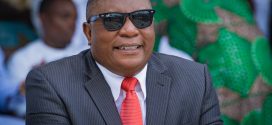Don’t Believe the Lie: There Is No War Against Corruption In Nigeria (2), By Femi Aribisala
In Buhari’s first coming, he bamboozled Nigerians with a so-called War Against Indiscipline. This entailed treating Nigerians, young and old, like primary school children. We were forced to queue at bus-stops under the watchful eyes of soldiers wielding whips with orders to flog publicly those deemed unruly. Late-coming civil-servants were required to do frog-jumps. The pathetic thing about this was that the government actually believed such charade constituted cogent public policy. Once Buhari left, Nigerians stopped queuing. So much for the War Against Indiscipline.
The truth of the matter is that President Buhari is a retired military officer; he has little idea what constitutes effective public policy. As military strongman in the 1980s, he dealt with food shortages by sending soldiers to break into private warehouses and shops. He fought trade imbalances by taking Nigeria back to the stone age of trade by barter (counter-trade). He sought to extradite a Nigerian from Britain by drugging and crating him. These are the indices of a man bereft of modern and judicious policy ideas.
Fighting corruption with corruption
The same goes today for Buhari’s newfangled “war against corruption.” The whole thing is one big farce. The president clearly does not know what corruption means and how to fight it. As a result, he ends up with the contradiction of attempting to fight corruption with corruption; an exercise in futility.
As military head of state in the 1980s, Buhari failed to understand that imposing retroactive decrees and killing Nigerians under them was corruption. Putting the Igbo vice-president in Kirikiri prisons, while placing the Fulani president under palatial house arrest, was corruption. Detaining people like Michael Ajasin strongman, Buhari jailed Bisi Akande on corruption charges in the 1980s. But come 2014, the same Bisi Akande became the interim chairman of his anti-corruption APC. In 2015, Femi Gbajabiamila was the APC choice as Speaker of the House of Representatives. Today, he is the Majority Leader of the House. However, Gbajabiamila was convicted for professional misconduct by the Supreme Court of Georgia, U.S.A. in 2006 for defrauding a client of $25,000.
While the government is busy grandstanding about anti-corruption in the press, its APC legislators are busy fighting over “juicy” committee positions in the House and Senate. Surely, “juicy” legislative committees are anathema to anti-corruption. What makes a committee “juicy” is precisely its scope for providing avenues for corrupt enrichment to legislators.
Anti-corruption hypocrisy
APC’s anti-corruption crusade has become so lopsided, it is clearly no more than an instrument for check-mating and decimating the opposition. The standard retort is to insist the singling out of PDP members is inevitable because the party had been in power for 16 years. However, some of the legacy parties of the APC, such as the ACN, have also been in power for long in the states. The EFCC has gone after PDP governors, such as Sule Lamido and Godswill Akpabio, but has ignored APC governors, such as Rotimi Amaechi and Babatunde Fashola.
A judicial commission of enquiry set up by the Rivers State government maintained that, under former governor Rotimi Amaechi, a whopping N53 billion disappeared from the Rivers State Reserve Fund. However, the EFCC has not even invited Amaechi for questioning. Neither has he been excoriated in the government’s media war on corruption. On the contrary, Amaechi has been awarded the “juicy” new super-ministry of Transport, which now includes road, rail, maritime and aviation.
Similarly, Babatunde Fashola was accused of spending N78 million of government money upgrading his personal website. Among other allega Similarly, Babatunde Fashola was accused of spending N78 million of government money upgrading his personal website. Among other allegations, he was said to have inflated the cost of the Lekki-Ikoyi link-bridge from N6 billion to N25 billion. However, the EFCC hears no evil and sees no evil in the Fashola case without even investigating it. Instead, Fashola was awarded the “juicy” new super-ministry of Power, Works and Housing.
Abubakar Audu was under prosecution by the EFCC for misappropriating N11 billion of state funds when he was governor of Kogi between 1999 and 2003. Nevertheless, he was nominated as APC governorship candidate for Kogi in 2015. In spite of the fact that the EFCC had filed charges of corruption against Timipre Sylva for defrauding Bayelsa State of N19 billion between 2009 and 2012, he nevertheless became the governorship candidate of the APC for Bayelsa in 2016.
How can the government expect Nigerians to believe it is sincere in fighting corruption under such hypocritical circumstances?
Anti-corruption public relations
Anti-corruption is good public relations, but it is no substitute for a viable programme for economic growth. In the final analysis, the government’s anti-corruption campaign is all sound and fury signifying nothing. Making a difference means fulfilling the government’s campaign promises. It means ending the petrol shortage. It means increasing electricity generation and distribution. It means providing jobs for unemployed youths. It means providing social security for the teeming poor. In these practical decibels of government, the APC is at sea. It simply has no idea what to do.
PREMIUM TIMES
 Hottestgistnaija.com
Hottestgistnaija.com





